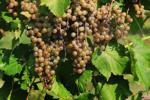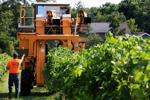By Amanda Hancock | September 9th, 2018
Ben Arndt estimates it was 150 degrees atop a steel water tower in a small Kansas town when a glance toward the ground changed his life.
During a break from painting and sandblasting the water tank, Arndt looked 200 feet down and saw some guys working in a vineyard.
“Well, they look like they’re having a good time,” he thought. “And I’m up here cooking like an egg.”
When he got back home to DeWitt, Arndt stopped at the Theisen’s store and bought about 60 concord plants for his back yard.
And they grew.
“That was the start of it,” he said.
It was the start of Tycoga Winery, which now grows 22,000 plants on 23 acres on an idyllic, lodge-like property off Highway 61 in DeWitt. The winery, built in December 2014, serves local and traveling customers 20 varieties of wines, including several award winners.
Before a single grape was grown, though, Arndt had to convince his wife, Carey, of his plans. He said he was drawn to the “whole ambiance” of a vineyard.
“It looked like more of an enjoyable job you’d want to spend the rest of your life doing, versus climbing a water tower at a couple hundred feet in the air,” he said.
Carey Arndt’s response?
“I thought he was crazy,” she said.
They weren’t even wine drinkers.

A growing industry with rich history
Tycoga Winery is one of the latest to join Iowa’s growing wine industry, which is crowded with stories of small, family-owned operations and hobbies that turned into full-time jobs.
Iowa now has 95 wineries, which contribute to an annual economic impact of $420,000,000, according to the Iowa Wine Growers Association, which was established around the same time a crop of wineries opened around the state in 2000.
But Iowa’s wine story started much earlier.
The state’s first vineyard arrived as early as 1857, when grapes were planted in the rolling hills of western Iowa. In fact, prior to the start of Prohibition in 1920, Iowa was the sixth-largest wine producer in the nation.
In the decades that followed, however, grape production slowed — due partly to a severe blizzard in 1940 and in part because of agriculture’s shift toward row crops.
But wine has been making a return to the region over the past 25 years, courtesy of new, heartier varietals of grapes that do well with Iowa’s cold winters and short growing season.
“This industry has massively grown,” said Ilene Lande, who got into the wine business in 2004 and opened Brick Arch Winery in West Branch in 2011.
Lande, who previously ran a biotech company for 25 years, says she discovered a new use for her PhD in microbiology when she got into winemaking.
And?
“It’s the most fun research I’ve ever done,” she said. “Learning to make really good wine is the work of a lifetime.”
The main challenge for Iowa wine is getting grapes to tolerate the region’s climate, which is stressful, she said.
“It mostly comes down to weather,” Lande said. “This is not ideal grape country. The rule of thumb is that if it’s good for corn, it’s not good for our grapes.”
Lande said she hears from people regularly who won’t visit an Iowa winery, saying “Well, I know what Iowa wine tastes like.”
And by that, she said, “They mean it’s all very sweet.”
Not so.
“People need to let go of that prejudice,” Lande said. “That’s not true anymore. Unless you’ve been to an Iowa winery recently, you don’t know what it tastes like.”

As the grapes get better, the results of Lande’s work get better, too.
“If you tasted Iowa wine 20 years ago and tasted wines recently, you’d be astonished at how they have changed,” she said. “There are so many more grapes available for us now.”
The grapes grown here now aren’t Chardonnay or Cabernet Sauvignon, which the owners of Park Farm Winery in Durango, point out are, “simply unable to survive or produce quality fruit in our region.”
Iowa’s grapes are cold and hardy and bred to withstand temperatures as low as 40 degrees below zero. Here, white wine grapes have names like Edelweiss and Brianna and LaCrosse, and red wines are made with varietals, such as Marquette and the new Petite Pearl.
Minnesota grape breeder Tom Plocher developed Petite Pearl, which is the talk of the town in Iowa wine country for its production of dry red wines.
The new breed of Iowa grapes and their resulting wineries are the subject of a recent documentary film, titled “Wine Diamonds: Uncorking America’s Heartland.”
Part of the movie’s description says this: “These grapes, the farmers and wine makers of the Midwest are pushing the envelope of viticulture and enology.”
Wine wisdom from another Iowan
Ben and Carey Arndt didn’t start out knowing about Iowa’s wine history or its challenges.
Early on in their grape growing — sometime in 2012 — they became the grateful recipients of some winery wisdom from John Burns.

The owner of Barrelhead Winery in Dubuque, Burns was driving on Highway 61 one day when he noticed the grapes in the Arndts’ back yard. He decided to stop by.
“It looked like they were struggling,” he said. “So, I gave them a lot of advice. Anyone who asks, I generally tell them what to do, especially if they’re nice people. There’s a lot to learn.”
Some of Burns’ advice is basic, including, “This is the absolute truth: You cannot make a good wine unless you start with a good grape.”
He also advised the newbies to keep lots of notes.
Burns, who is 70, says his passion for wine began 50 years ago, when he was stationed in Germany with the military. When he got chances to explore, he looked into different styles of wine.
“There was never a wine culture here in Iowa, so it was so new to me,” he said. “I learned about it over there. It’s easy to get hooked on wine over there.”
Now, Burns says his home state is full of respectable wineries, many of which work together to trade grapes, tips for growing and other bits of learning.
“We’re probably better known outside of Iowa than we are inside the state,” he said. “For us, it’s about making the best possible wine you can with what you have.”
His four-acre estate winery (meaning he grows all the grapes he uses in his wines) is one of many helping to promote what’s special about the state’s industry.
“Our grapes are tougher than hell,” Burns said. “And because of that, our wine will taste different than anyone else’s. In the Midwest, we have something the rest of the world doesn’t. California’s got nothing on us.”
And that’s the general rallying cry for the state’s eight winery trails, which urge Iowans and out-of-staters to explore the state’s beauty and homegrown wine.
Tycoga Winery belongs to the Iowa Wine Trail of the upper Mississippi Valley region, the oldest trail that features 10 active members, including Brick Arch in West Branch, Eagles Landing Winery in Marquette, Empty Nest Winery in Waukon, Engelbrecht Family Winery in Fredericksburg, Park Farm Winery in Bankston, PromiseLand Winery in Guttenberg, Tabor Home Winery in Baldwin, Wide River Winery in Clinton and Winneshiek Wildberry Winery in Decorah.
“Something like that (the Wine Trail distinction) brings us all closer together and helps us all be better,” said Ilene Lande, of Brick Arch Winery. “And marketing-wise, it helps us get our names out there by being part of something bigger.”
‘Look out, Napa’
On a recent tour of Tycoga Winery, with harvest season just a few days away, it was evident that any nerves or remaining hesitation about entering the wine business have dried up for Carey Arndt.
The 49-year-old oversees the day-to-day operations, books weddings and special events and often chats with customers as they lounge on the property, taking in its picturesque surroundings.
“This kind of feels like an escape for a lot of people,” she said. “I’m all about it now. We didn’t see anything like this happening, but I’m glad we took the leap.”
Taking the leap included tasting early samples of Tycoga wine.
“It took us a minute to like wine,” she said with a laugh. “We started acquiring the taste as we kept testing it and went with what we liked. Now, we love it.”
As do patrons who stop by the tasting room or purchase Tycoga wine in area Hy-Vee stores.
“People are like, ‘Wow, this is in DeWitt? This is in Iowa?’” she said. “I hope Iowa will be the new Napa. I can see it happening. Our wines are just as good.”
And, she said, their wines often taste unlike anything customers are familiar with.
“What’s unique about our wines is that it’s made right here in Iowa,” she said. “And it’s made by our kids.”

Her son, Tyler, who is in his mid-twenties, is the head winemaker.
While he wouldn’t call himself a wine lover, Tyler Arndt has found he shares a passion for the winery life that caught his father’s attention on that summer afternoon several years ago.
“I like working outside,” Tyler Arndt said. “I don’t want a desk job.”
It’s still hard work, but their grape-picking process recently got an upgrade in the form of a mechanical harvester.
“It’s going to make life a lot easier,” he said.
And the machine will, hopefully, allow the Arndt family to increase their production and, as a result, their distribution.
The mastermind behind Tycoga Winery says growth will come one step at a time.
“We didn’t know how it was all going to turn out, and we’re still learning,” Ben Arndt said. “It’s going well, though. So far, so good.”
There’s another reason Ben Arndt wanted to open the winery: It’s spelled out in the name Tycoga, a word formed from the first two letters of the names of their kids, Tyler, Courtney and Gabe.
It’s also spelled out in one of their wines, named after their 2-year-old granddaughter, Brooklyn.
“It’s all about family and our kids,” Carey Arndt said. “That’s why he (Ben) did it. We wanted to keep them around. And, maybe one day, this will be theirs.”
It depends, of course, on how the grapes do and how the wine sells.
Behind the tasting room counter near the end of the tour, Carey Arndt poured a few samples of wine and explained their flavors to a group visiting from Arkansas.
After the tasting, she saw some of the visitors out and invited them to come back on a weekend, when the winery hosts live music and serves wood-fired pizzas.
“Look out, Napa,” she said, holding the door open for a couple coming in. “We’re coming for you.”
